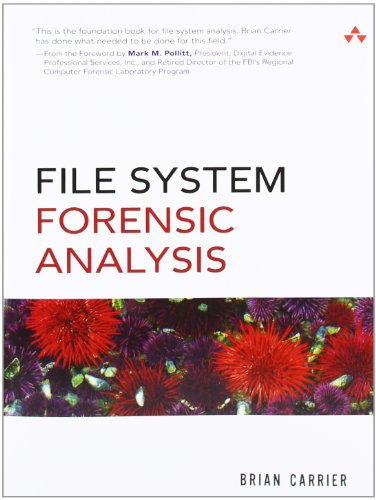File System Forensic Analysis epub
Par cuellar ruthie le samedi, juin 17 2017, 10:31 - Lien permanent
File System Forensic Analysis by Brian Carrier


File System Forensic Analysis Brian Carrier ebook
ISBN: 0321268172, 9780321268174
Format: chm
Publisher: Addison-Wesley Professional
Page: 600
Grid File Systems: A Forensic Analysis Joshua Boyd College of Information Science and Technology, Radford University Radford, Virginia 24142, United States of America and. One of my peers recently wrote an article providing a good introductory explanation of computer forensics in his review of a SANS course. Besides its other capabilities, fileXray has an extensive feature set geared for HFS+ file system forensics. With modules for file system analysis, e-mail, keyword search, registry, and bookmarking, Forensic Explorer has the essentials. We published a Technical-Report with id CS-2011-06 (ISSN 2191-5008) named Reverse Engineering of the Android File System (YAFFS2) today. Forensics 2: Identifying File System and Extracting it. Here's a starter list: File System Forensic Analysis, Brian Carrier. File System Forensics by Brian Carrier. Memory dump; Page or Swap File; Running Process Information; Network data such as listening ports or existing connections to other systems; System Registry (if applicable); System and Application logfiles (IIS log files, event logs etc.) Database Forensics. This article dealt primarily with what we term system or file system forensics. This new file system is proprietary and requires licensing from Microsoft and little has been published about. I'm pretty sure this dude dreams in binary. This is a quick overview of the relevant features—details can be found in the fileXray User Guide and Reference ebook. Since activity was discovered towards the database server, it would be very interesting to execute a more in-depth investigation towards the database and it's files. For example, chapter 4 is dedicated to the HFS+ file system used by Macintosh computers and drills down to disk level file system forensics. At the time of choosing what to do, I was enrolled in another class focusing on file system forensics and we were doing in depth analysis of the FAT file system. I have a huge interest in file system forensics, so I have been following his Tri-Force blog posts and was anxious to hear his scheduled talk on the NTFS Logfile Forensics/Tri-Force during CEIC.